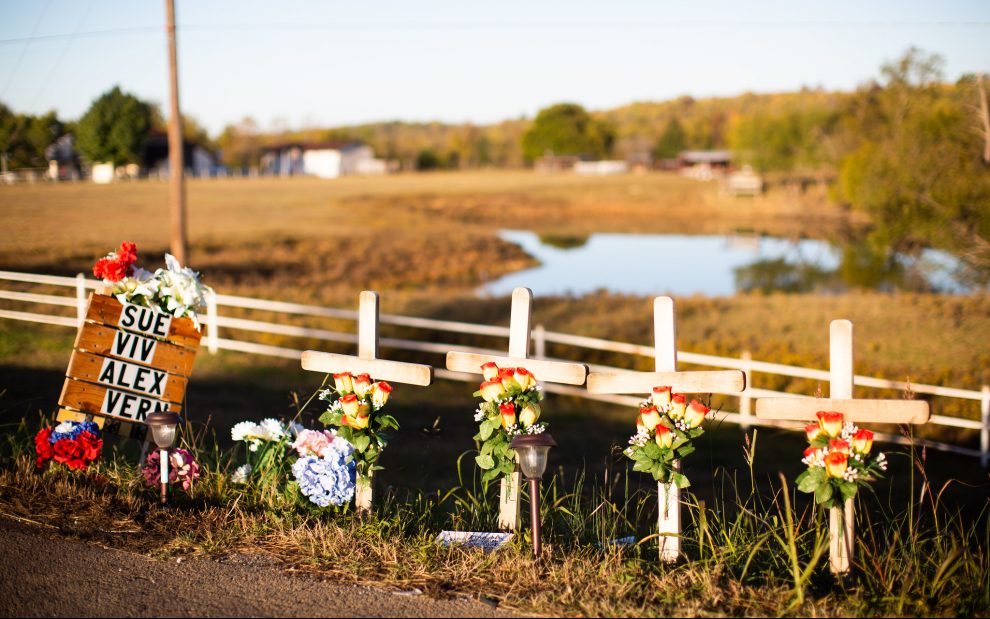I see them all the time, naked white crosses on the shoulder of the road, on the other side of the ditch, at that bad curve on the highway.
There’s one on a high riverbank where a kid drove off into the river and the car sank bubbling and they found him blue a day later.
There’s one near the beach where two lanes merge into one, but if you are drunk and driving too fast through the utter darkness of the ancient forest you maybe miss the merge and hit a fir tree bigger than a house and you turn into past tense, a story people tell.
There’s one on the most innocent farm road you ever saw where nobody should ever have an accident but a girl did one bright afternoon and no one knows why.
There’s four of them all together like a silent tiny white forest: four kids roasted when their car flipped and rolled and burned. The grass was black there for the longest time.
And I live in Oregon, where a spontaneous shrine grew and grew and grew by the school fence at Thurston High School in the old timber town of Springfield in 1998 after a 15-year-old kid named Kip Kinkel shot his mother and father to death and then walked into school with two guns in the morning and opened fire and murdered two kids, Mikael Nickolauson and Ben Walker, and wounded 25 other kids before a wrestler named Jake tackled him. In the days after, thousands of people walked to the chain-link fence outside the school and tied things to the fence: photographs, flowers, balloons, quilts, a commencement gown and cap, notes, verses from the Bible, every conceivable form of prayer and mourning and memory. The shrine stayed there for weeks and weeks and weeks. No one had the heart to order it dismantled.
People came all day and night to see that hole in the world where prayers went up into the sky like a river of tears. The fence is still there, naked now, and a friend there tells me people still stop at it day and night and pray. A chain-link chapel, open to the elements, soaked in rain and rue.
I do not ask why we do this, why we erect little white crosses and signs and mounds of flowers and cairns of stones where people died. We know why we do this. We cannot not do this. We mark the spot where the soul left the body and returned to Sender. These places are holy. They are holes wrenched open suddenly, often in flame, doors through which a soul has passed through this world.
To me they are holier than any church, in the same way a mother’s belly is holier than any church, because those sweet bellies and those holes in the grass are where souls entered and left this intricate realm; they are places of mercy and mystery; they are the portals from which the created emerges and through which the created departs.
Hospital beds, ambulance gurneys, wet ditches in wars, seething smoking holes where gargantuan buildings were destroyed by murderers in airplanes, quiet bedrooms in quiet houses, icy mountain ledges, howling seas, serene back gardens while digging in the compost—we die everywhere, and everywhere that spot is henceforth holier than before.
We are alone, each and all of us, even as we swim in the ocean of love and grace that is our joyous work here; and we will die alone, each of us, leaving our bodies behind at some moment brooding in the future. And bed or beach, highway or hospice, those who love us will mark that spot, and then mark the spot where our bones are laid to rest or ashes swirled into the thirsty sea.
Once, there, in those spots, something left the Earth. The words we have are so thin. Life, soul, the miraculous energy that drives bone and meat toward love and light, the electric prayer of her, the hymn of him: gone. But not gone. Is there a wilder, crazier, truer belief than that?
And if life is a miraculous opening, why cannot death be a miraculous opening also?
So those thin naked white crosses in the rain, that dripping chain-link fence at Thurston High: maybe they are not exits, after all. Maybe they are the holiest doors. Maybe they are not holes where something emptied out. Maybe they are holes through which something pours in: a love so far beyond our ken that we can only stand there mute, riven, blessed.
Image: Flickr/Thomas Hawk















Add comment